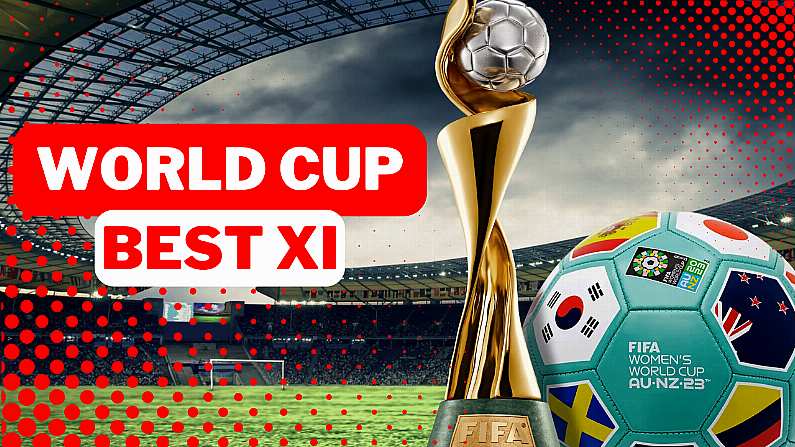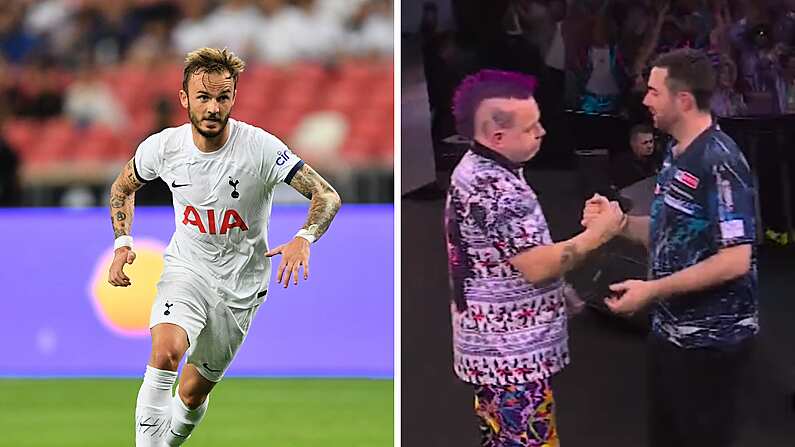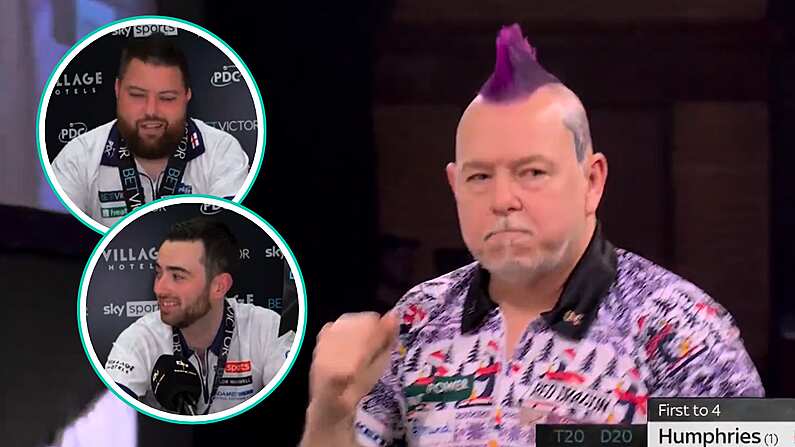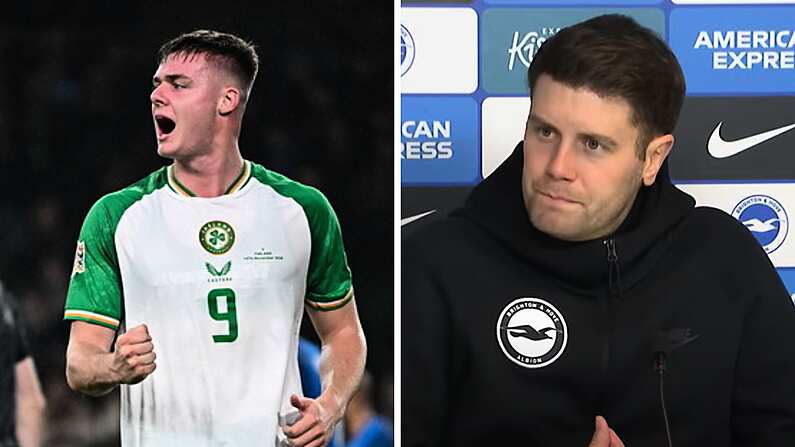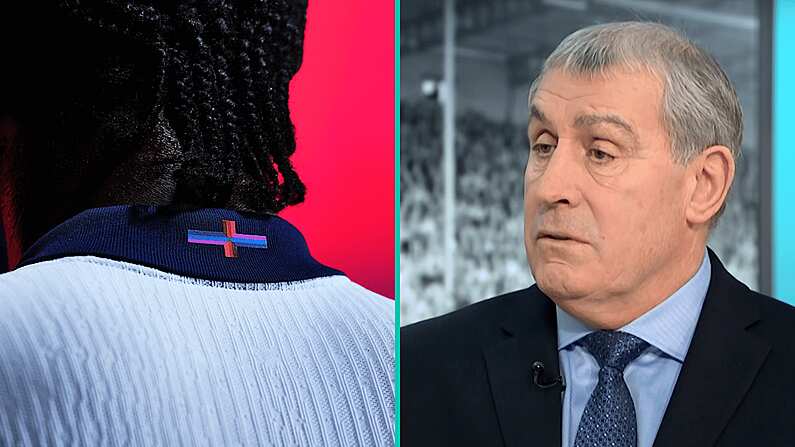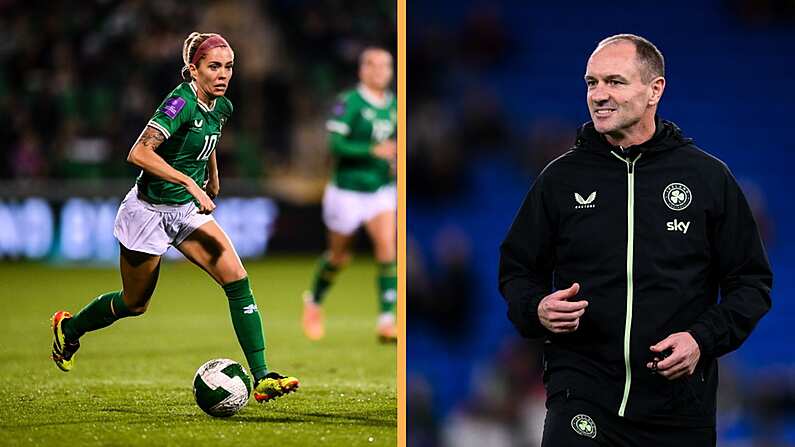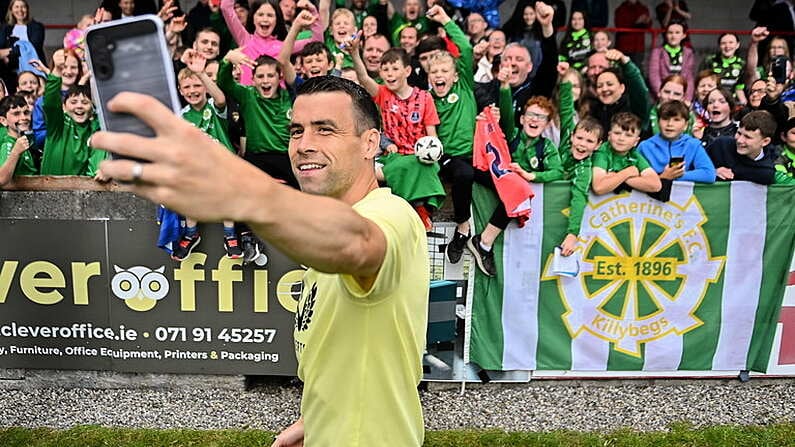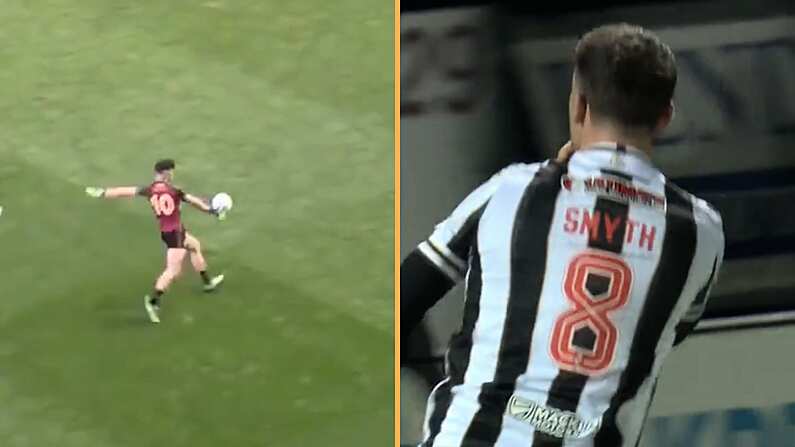Picking a Women’s World Cup team of the tournament is a tall order given all of the talent that was on offer over the past month, but Balls.ie have you covered.
After 64 games, tiki taka Spain emerged as the champions in spite of management controversy, while England fell just short and suffered only their first competitive loss under Sarina Wiegman.
Sweden picked up a consolation bronze medal and cut short the dreams of hosts Australia, while Japan and Colombia emerged as fan favourites throughout a new look knockout stage which saw the USA, Germany, Brazil and Canada all fail to progress to the latter stages.
Shock after shock and dramatic progression after dramatic exit the tournament saw world renowned names as well as rising stars feature their genius, with the best of the best across the pitch selected right here.
GK-Mary Earps (England)
Notable mentions: Cata Coll (Spain), Mackenzie Arnold (Australia), Zećira Mušović (Sweden).
The adidas Golden Glove Award goes to Mary Earps! 🧤 pic.twitter.com/C25R45tfbm
— FIFA Women's World Cup (@FIFAWWC) August 20, 2023
Goalkeepers, their performances, and their lack of deserved recognition were all under the microscope during this tournament, none more so personified than with England’s Mary Earps.
The Golden Glove winner conceded just four goals in the entire competition, keeping three clean sheets. Before everything even kicked off she was already pushing for improved standards after Nike announced they weren’t going to be selling the goalkeeper editions of their jerseys and throughout the tournament she demonstrated why that may have been a mistake.
She came to their rescue on many occasions at all stages of the tournament, picking up the POTM award vs Nigeria in the knockouts and imprinting her mark once again in the final to save a penalty and keep England in with a fighting chance.
Australia’s Mackenzie Arnold and Sweden’s Zećira Mušović were also penalty heroes during the course of the competition, while Spain’s Cata Coll proved her worth when she came into the team in the round of 16, but it was Manchester United’s Earps who reigned supreme.
Mary Earps has just saved a penalty in a World Cup final and you STILL can’t buy her goalkeeper shirt. It doesn’t get much more glorious than that as a ‘keeper, and it’ll inspire so many. Sort it out @Nike pic.twitter.com/jovGZ6ddcj
— Charlie Haffenden (@JournoHaff) August 20, 2023
LB- Olga Carmona (Spain)
Notable mentions: Stephanie Catley (Australia), Rachel Daly (England), Katie McCabe (Ireland)
🏆⭐ Olga Carmona Official POTM of the FIFA World Cup Final. pic.twitter.com/uN8EdfwRd7
— Madrid Xtra (@MadridXtra) August 20, 2023
Spain’s on pitch captain Olga Carmona made sure her impact was felt in the final, collecting the POTM award for her winning goal showcase.
The 22 year old Real Madrid player stepped up in the business end of the tournament to drag her side through, and, having only made her senior debut in April 2021, showed the composure and leadership her experience of being involved in winning U19 international teams may have granted. Sadly, a joyous occasion has been shrouded in grief for her as she was notified of her father's passing after the game.
England’s Rachel Daly also impressed overall, despite playing out of position for the entire tournament. It was however true to form for Wiegman to favour her in that spot having done so in the Euros campaign too. Before the Australia and New Zealand competition had started she had just been awarded the WSL player of the season for her exploits at striker for Aston Villa last season, and when push came to shove she still found a way to influence England’s play even though she was further back the pitch than she would like.
As for Katie McCabe, that just had to be done. The Ireland captain and the Arsenal legend recently picked up the WSL goal of the season, and her goal against Canada is surely up there for goal of the tournament too, whether she meant it or not.
29" GOAL SPAIN 🇪🇸
Olga Carmona with a pinpoint accurate finish to put Spain into the lead against England #FIFAWWC
📺Watch: https://t.co/JYf06csaIG
💻Updates: https://t.co/QV0zdyqqPp #RTESoccer pic.twitter.com/KF1z1dwQ0F— RTÉ Soccer (@RTEsoccer) August 20, 2023
CBs- Alex Greenwood (England) and Amanda Ilestedt (Sweden)
Notable mentions: Millie Bright (England) , Jess Carter (England), Alanna Kennedy (Australia), Nathalie Bjorn (Sweden), Sakina Karchaoui (France).
Massive shoutout to Alex Greenwood, who stepped into the place of England’s captain Leah Williamson, and was a genuine contender for Player of the Tournament.
Class the whole way 🌟 pic.twitter.com/RwD7IMH5Ep— Women’s Transfer News (@womenstransfer) August 20, 2023
Both England and Sweden were some of the most defensively solid teams in the tournament, and so it's no surprise their centre backs would be at the receiving end of such high praise.
For The Lionesses, a switch to a back three system saw Greenwood star alongside Bright and Carter, with the former shining in clinch tackles, while also being as tough as nails.
To the Swedes' credit Ilestedt kept things contained at the back, but also offered an unexpected attacking threat down the other end of the pitch. Before the tournament the defender had accumulated eight goals in 64 appearances, but she was on fire Down Under and slotted away four more to add to her tally.
✨ 𝗮𝗱𝗶𝗱𝗮𝘀 𝗯𝗿𝗼𝗻𝘇𝗲 𝗯𝗮𝗹𝗹 ✨
Amanda Ilestedt har blivit utsedd till VM:s tredje bästa spelare av FIFA 🇸🇪 pic.twitter.com/k0kgWb5akh— Svensk Fotboll (@svenskfotboll) August 20, 2023
RB- Ona Batlle (Spain)
Notable mentions: Lucy Bronze (England), Ellie Carpenter (Australia).
Ona Batlle went to comfort Barcelona teammate Lucy Bronze after the World Cup final ❤️💙 pic.twitter.com/2qCXVvauO7
— B/R Football (@brfootball) August 20, 2023
The right back position really was a toss up between two superstars of the women's game- Ona Battle and Lucy Bronze.
Their final game exhibits tipped the scale the former Manchester United player, Battle's way, although Barcelona fans will only be delighted with the depth of quality they'll now have in that position after she completed her transfer there this summer.
In Australia and New Zealand however she's the one who's come out on top.
Against England she managed to aid in keeping Lauren Hemp tempered while also providing Daly with plenty of headaches with her runs down the wing. She triumphed in that against Sweden, the Netherlands, Switzerland and the group stages as well, earning her a place in the XI.
Only Spanish player I'm happy for today. Best full back around.
Ona Batlle - Once a red, always a red🫶#ESP #MUWomen pic.twitter.com/bXcDJkiHdp— Conner Roberts (@ConnerRoberts_) August 20, 2023
LM- Linda Caicedo (Colombia)
Notable mentions: Fridolina Rolfö (Sweden), Caitlin Foord (Australia).
✅ Overcame cancer at 15
✅ Scored in THREE different World Cups in the same year (U17, U20, WWC)
✅ Second-youngest South American goalscorer in WWC history at just 18 years old
Linda Caicedo's journey is only just beginning ⭐ pic.twitter.com/StBMPsNUd2— ESPN FC (@ESPNFC) August 12, 2023
Colombia's up-and-comer Linda Caicedo may be young, but she's beyond doubt been one of the standout players of the Women's World Cup.
The 18-year-old had her name on everyone's lips with her phenomenal build up play and ability to drive forward, writing her side into the history books when they made it to the quarter finals, only to be knocked out by England.
With the Real Madrid player in their ranks the future looks to be in good hands however, and despite valiant attempts by Fridolina Rolfö and Caitlin Foord, she picks up the prize in her position.
Linda Caicedo sat alone in the goal reflecting on her first World Cup where she’s taken headlines 🇨🇴
She’s only 18. pic.twitter.com/Q9zGijEMzY— Alex Ibaceta (@alexibaceta23) August 12, 2023
Midfield- Hinata Miyazawa (Japan) and Aitana Bonmatí (Spain)
Notable mentions: Jennifer Hermoso (Spain), Georgia Stanway (England), Kosovare Asllani (Sweden), Jill Roord (Netherlands), Kenza Dali (France), Kadidiatou Diani (France).
With 5 goals for Japan, Hinata Miyazawa wins the Golden Boot at the 2023 FIFA Women's World Cup 🔥⚽️ pic.twitter.com/QHN9O0D2GA
— FOX Soccer (@FOXSoccer) August 20, 2023
You simply couldn't leave Japan's Hinata Miyazawa out of any team of the tournament. Her side lit up the competition with their style and tactical fluidity, giving hope to the underdog before they were put a stop to by Sweden at the quarterfinal stage.
Spain's Aitana Bonmatí is the other pick. Arguably Jennifer Hermoso should also be in the conversation, but given Miyazawa tucked away five goals and one assists during her five matches in comparison to the the La Roja woman's three goals and two assists in seven games, it's the tightest of margins.
Bonmatí had the exact same record as Hermoso, although her effect on every single game a was untenable, seeing her gather the golden ball in acknowledgement of that.
Georgia Stanway rose to the standard for England in Kiera Walsh's absence but didn't outshine the two selected, and the same goes for France's Kenza Dali and Kadidiatou Diani, Sweden's Kosovare Asllani and the Netherland's Jill Roord, who all had their moments but failed to bring their respective teams further in the competition.
Aitana Bonmati: “I want to remember all the women that have been pushing & fighting over the years”
[🎥@7Sport] pic.twitter.com/ecricqL70m— Louise Taffa (@Louise_Taffa) August 20, 2023
*RM- Lauren James (England)
Notable mentions: Hayley Raso (Australia), Alba Redondo (Spain).
Despite playing just 5 games (332 minutes), Lauren James had the joint Most Assists (3) and 2nd most Goals + Assists (6) at the World Cup. 👏
One of the best young players in the world and she’s just getting started. 💫 #FIFAWWC pic.twitter.com/A8pmKJnpL6— London Is Blue Podcast ⭐️⭐️ (@LondonBluePod) August 20, 2023
Possibly the most controversial selection, England's Lauren James also squeezes in to this team of the tournament XI, vindicated by her stats if nothing else.
Yes, she missed the quarter and the semi-final due to a moment of madness and a petulant mistake for a stamp during the Nigeria game, but she took her punishment and was undeniably a major player for England in the final, and the entire tournament.
Granted, she usually plays on the right side of a midfield as opposed to in the right midfield position or the right wing, if she hadn't committed that act she would have been up for overall player of the tournament, and her numbers don't lie on that front.
Her exceptional touch, technical passing and sublime strike put her a class above, and even with her two game ban she still managed three goals and three assists, which is more than both Bonmatí and Hermoso.
A bit of what-if mindset surrounds the player of course, but that potential will live to see another day, and plenty of other major tournaments for the 21-year-old.
World Cup Silver medalist 🥈
LAUREN JAMES 👏 pic.twitter.com/7O521iHOzB— @Chelseawomen_ (@Chelseawomen_) August 20, 2023
ST- Salma Paralluelo (Spain) and Lauren Hemp (England)
Notable mentions: Alessia Russo (England), Ella Toone (England), Mary Fowler (Australia).
▪️ U17 World Cup champion (2018)
▪️ U20 World Cup champion (2022)
▪️ World Cup champion (2023)
▪️ WWC Best Young Player (2023)
The future is bright for 19-year-old Salma Paralluelo 🌟 pic.twitter.com/ZesdgiexPM— B/R Football (@brfootball) August 20, 2023
19-year-old Salma Paralluelo was unquestionably one of the breakout stars of the World Cup, reflected in her selection as Young Player of the Tournament.
Often featuring off the bench, she cemented herself as a big game player, and winner. She scored the decider in the quarter final versus the Netherlands, propelled her team ahead against Sweden in the semi final and indeed almost scored in the final itself too.
Lauren Hemp then wasn't tipped to be one of England's leading players coming into the tournament, but turned that notion on its head as things went on. She too made a difference on the scoresheet in both the quarter-final versus Colombia and the semi-final against Australia, of course helped along by fellow England forwards and dynamic duo Alessia Russo and Ella Toone in the process.
🇦🇺 1-2 🏴
England back in front as Lauren Hemp capitalises on indecision in the Australian defence
📱 Updates: https://t.co/Zp9dFpbLu8
📺 Live on @RTE2 and @RTEPlayer#FIFAWWC #WWC2023 pic.twitter.com/CiL2FiiUHj— RTÉ Soccer (@RTEsoccer) August 16, 2023
SEE ALSO: RTÉ Panel Point Out Glaring Issue World Cup Final Officials Missed

